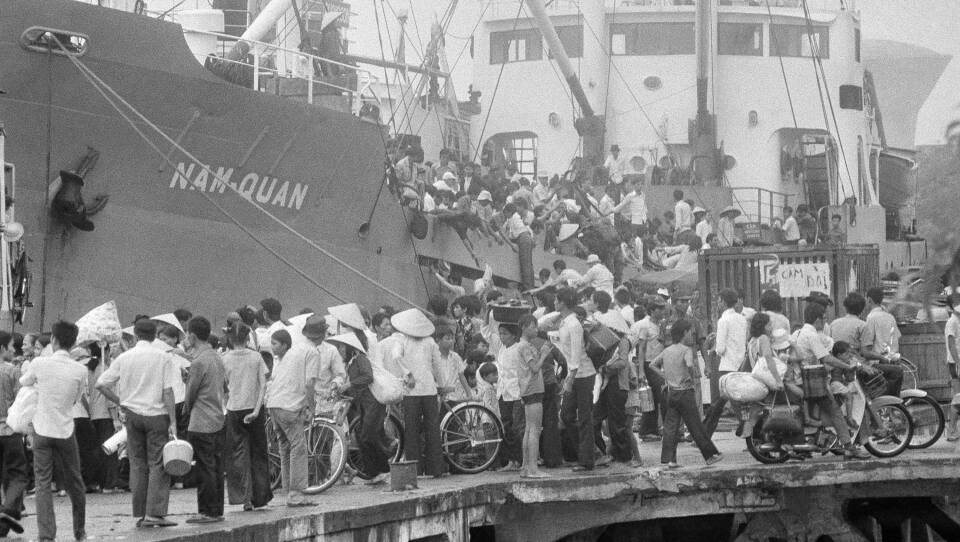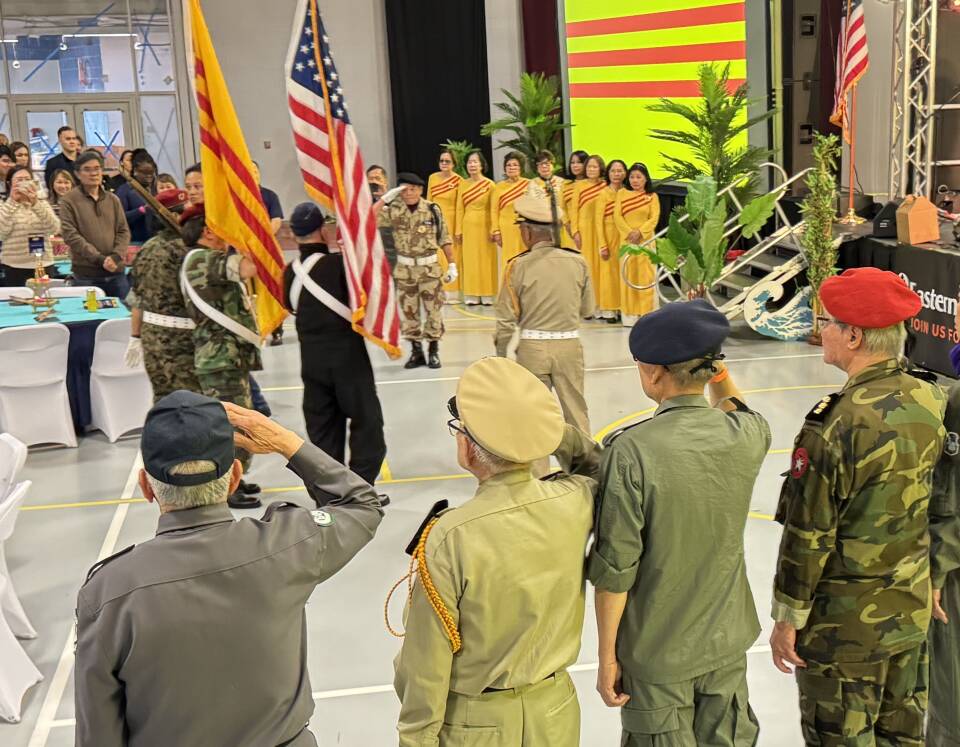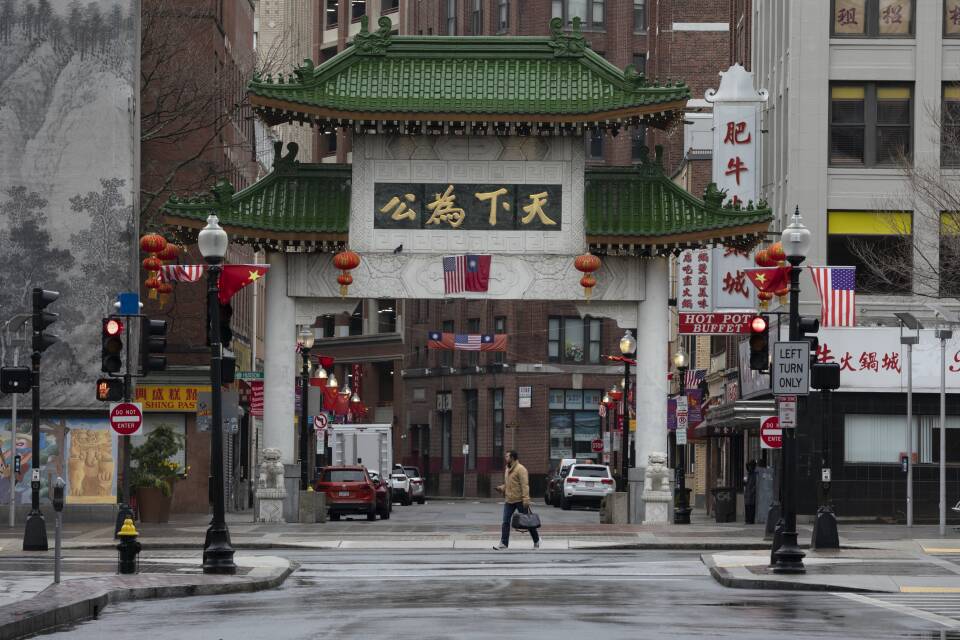On April 30, 1975 — 50 years ago last week — North Vietnamese troops captured Saigon. That sent U.S. citizens, military personnel and South Vietnamese civilians who feared persecution fleeing the country.
For the vast majority of South Vietnamese refugees, getting to somewhere safe was not easy. In fact, it was a harrowing ordeal. Catherine Vuky, assistant professor for the Clinical Psychology Department and the Director of the Asian Mental Health Concentration at William James College, and her family were among those who fled to the United States. She joined GBH’s All Things Considered host Arun Rath to share more about their escape. What follows is a lightly edited transcript.
Arun Rath: Catherine, first off, I know you were young when you and your family fled South Vietnam. How old were you? Can you tell us about your experience as much as you can remember?
Catherine Vuky: I actually don’t have any memories. All the stories that I have are basically stories I’ve heard from my parents and from my relatives growing up. I was a toddler — I was less than two years old, or around two years old, when I left.
Rath: You ultimately came to the United States, right?
Vuky: I did. It took us about eight months for the travel. We left Vietnam, actually, on May 5th, so that date is very meaningful for my family because that’s when we’d left Vietnam, and it took about a week or so drifting out to sea, and we landed in the Philippines.
Just thinking about our survival, we had actually asked for political asylum, and they turned us away. We were told to go back to Vietnam. It just so happened that we had priests and nuns on the boat, and so we asked for religious asylum.
I do believe that because the Philippines is a Catholic country, the archbishop — or bishop — came down and gave us asylum. But it did take us about eight months of travel to make it to the United States.
“I’m just thinking about his life — so many changes, so quickly — but it really was all for survival and for a future for his family.”Catherine Vuky, remembering her father and their escape from South Vietnam 50 years ago
Rath: Wow. And then, what was the process of actually getting to have the status to enter the United States?
Vuky: So, we were very fortunate that before the fall of Saigon, my uncle was actually already in the United States. This is such an amazing story. He was in Oregon at the time. He asked a fellow friend and said, “My family is in trouble. I need help.”
This gentleman, who I think was still in university, said, “Yes, I will sponsor. My family will sponsor your family over.” There were 40 of us who had some type of status when we were in the camps, so that’s how we were able to make it over to the United States.
Rath: And it was Oregon that you first made it to?
Vuky: Yes. Our final destination was in eastern Oregon.
Rath: Tell us what that was like. Are your first memories from Oregon?
Vuky: Yes. So, again, I don’t have memories of the actual Heppner — we were placed in Heppner, Oregon, and I believe that my family and relatives stayed in eastern Oregon for about a year, a year and a half. And then, we all moved into the bigger city — which is Portland, Oregon — which is where I was raised and lived.
We were very fortunate, I think. All my uncles, we’re all military family from Vietnam, high-ranking officials. And then, we were plopped into eastern Oregon, where my father became a farmer. So we had this picture of him on a tractor, and it was just really funny. You see this really skinny Asian man riding a tractor.
Again, I’m just thinking about his life — so many changes, so quickly — but it really was all for survival and for a future for his family. I constantly think about my family and all the other families, why they left, and then, 50 years later, where we are at this point.
Rath: I want to hear about how you made it out to the Greater Boston area, but also, was it just you and your family? Were there other families who were tracing the same path?
Vuky: So, on the boat, I was told that there were about 81 people on this little fishing boat when we left Vietnam. It was mainly my family, my cousins and my uncle, but there were other families as well.
Over the years, we’ve reunited with those families. They now relocated in Louisiana, but the majority of my family — the 40 of us — made it to Oregon. We had lived there our whole lives.
How I came to Boston was that I was in a graduate psychology program, and I came out here for my internship at Boston University. And then I stayed ever since, since I found my work here at the community health center as well as teaching at William James College.
Rath: I’ve got to ask you about what you do now. You’re the founder of the Asian Mental Health Program at your college. Tell us about this program and how you came to see a need for this.
Vuky: Absolutely. So, once I came up for my internship at Boston University, I was placed at the South Cove Community Health Center. We’re one of the largest ones that provide care to Asian refugees. My specialty is working with the Vietnamese immigrant population. I’ve been doing all this work for many, many years.
And then I started to teach at William James College, a Family Systems class. But also I was offered this opportunity to open the first Asian American mental health graduate psychology program in the country, and we’ve been open for five years. The whole purpose is to recruit and retain either Asian-identified students or others who really want to work with the community.
There is such a scarcity of Asian providers. As you know, the Asian population is growing in the United States, so there is a huge need for more Asian-identified providers who speak the specific languages in order to provide mental health care.
This was one of the purposes that I’m so proud to be able to open [the program] at William James College, and currently, we have about 22 students enrolled in the program.
Rath: I’m curious to ask you, because the way that your life experience and the work you do kind of dovetail: We hear that trauma can be generational, right? I’m curious, from your perspective, of the younger generation of Asian Americans who might be second or third generation here in America now, how they’re dealing with their mental health. Do you see a generational change?
Vuky: I do see generational trauma being passed down. I treat both the first generation — the parents and the grandparents — and the second generation. The children do not understand why their parents are not able to find work or learn English. They keep wondering: W can’t you be like the other parents, where we can have housing, where we have food, where we could have a car?
There are so many things. They’re saying, “All you do is sit at home.” You know, “You’re useless.” “Why can’t she be like others?” And when I talk to the parents, they’re saying they’re so traumatized — or at least they don’t want to pass on their fears and memories of wartime to their children because they don’t want them impacted.
There’s a lot of silence and fear in these families. And so my hope is to be able to bridge that because we see that the anxiety, the depression, the fear echoes in because they sense, like, “Oh, this is something I can’t ask about or talk about, or it makes my parents very sad.”
So there’s this learned behavior of [saying], “Let’s not talk about it.” I do see that over and over again in the immigrants and refugees that I treat.









